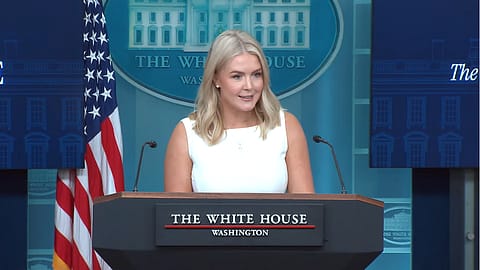Donald Trump admin to buy 10% stake in Intel; what does it mean for the beleaguered chipmaker?
Experts note that while this will renew interest in the chipmaker, the stake deal may not equip Intel enough to be able to compete with the current semiconductor players including Nvidia and TSMC.

The Donald Trump government will pick up a 10% stake in the beleaguered chipmaker, Intel. In a recent media briefing held last evening, U.S. press secretary Karoline Leavitt confirmed that the U.S. Commerce Department is ‘ironing out’ the details of the stake deal.
“As for this 10% government stake deal, the Department of Commerce continues to work on it. I know Secretary Lutnick is working on it and ironing out the details. The President wants to put America's needs first both from a national security and economic perspective, and it's a creative idea that has never been done before to ensure that we're both reshoring these critical supply chains while also gaining something of it for the American taxpayer,” said Leavitt, during a media interaction.
According to a Bloomberg report on Monday, a 10% stake in Intel entails the government converting their grants from the U.S. CHIPS Act (officially known as Chips and Science Act) into equity.
Passed under the Biden administration, the Creating Helpful Incentives to Produce Semiconductors (CHIPS) for America Act of 2022 provides funding or incentives to companies for producing semiconductors in the United States of America.
Intel reportedly has been allocated over $10.9 billion in grants for commercial and military chip production, along with access to $11 billion in loans, as per Bloomberg.
This 10% equity stake is expected to make the U.S. government the largest shareholder in the company, that is seen losing its edge since Taiwanese TSMC and Jensen Huang-led Nvidia achieved breakthroughs in semiconductor chip production.
Leavitt put emphasis on the point of reshoring the semiconductor supply chains, hinting at the push for Intel’s suspended efforts for an Ohio factory.
Recommended Stories
“The President has been very clear about the need to reshore manufacturing that's critical to our national and economic security, that is especially in regard to chips and semiconductors, which is why the President has initiated the commerce department to conduct a study on semiconductors, a Section 232 investigation so we can ultimately implement tariffs, and it's why our export license requirements remain in place as well,” Leavitt added.
Speaking to Fortune India, Prabhu Ram, VP - Industry Research Group (IRG), CyberMedia Research (CMR), says that the move is set to give a much-needed impetus to Intel.
"A US government stake, while unusual, represents a shift from traditional grants to a direct equity involvement. It would provide a fillip to Intel as it faces severe headwinds and an intense competitive landscape," Ram said.
He added that the move may incentivise other players along the supply chain to 'partner more closely with Intel’s foundry business.'
(INR CR)
Yet, Ram notes that there remains some scepticism on whether Intel’s foundry's pivot to contract manufacturing will succeed or not.
Tarun Pathak, research director, Counterpoint Research, however, says that this may not be enough to mend the company's recent missteps.
"US govt. will be setting a new precedent by converting Chips Act awards into equity stakes. This highlights the U.S. govt. push for chip manufacturing. It will likely accelerate Intel's plans to build and equip new domestic fabs, build investor confidence, stabilise stock, and build an IDM 2.0 strategy. On the other hand govt. may have a long term say in Intel plans and will create an uneven play field for other US based chip companies. However, funding alone is one part of it but Intel will need more clients and this can indirectly help them," Pathak told Fortune India.
The news coincides with the Softbank announcement of an investment of $2 billion in the chip giant. This reveals two things – one, SoftBank’s growing interest in painting itself as a ‘for-U.S.’ venture capitalist, given the company has already invested in OpenAI and its Stargate project for localisation in AI for the country. Secondly, the VC giant is all up for owning a part of the entire AI and consumer AI ecosystem, from semiconductors to AI products.